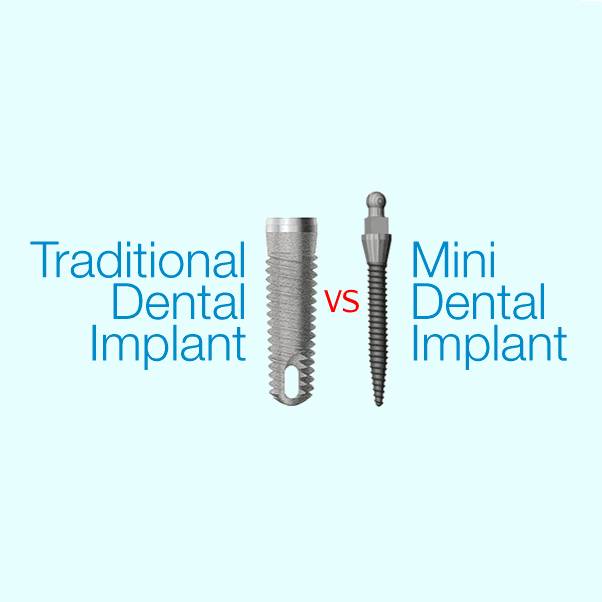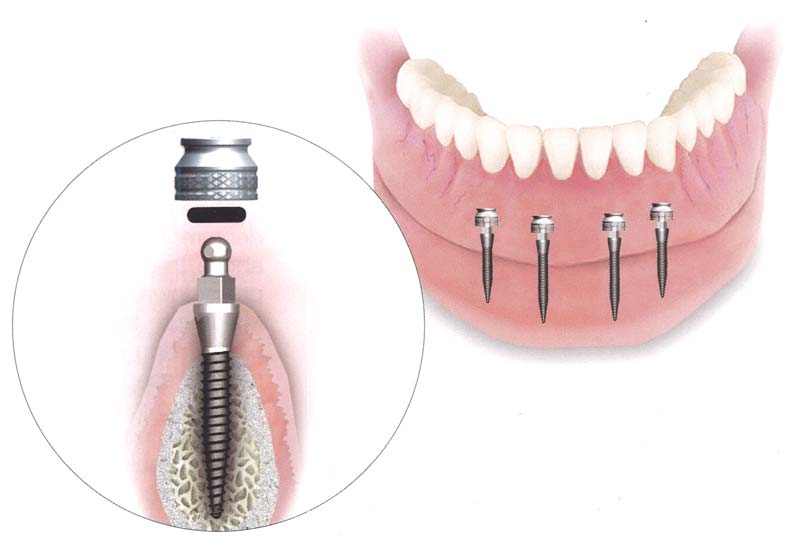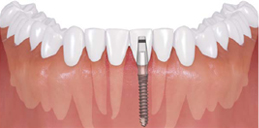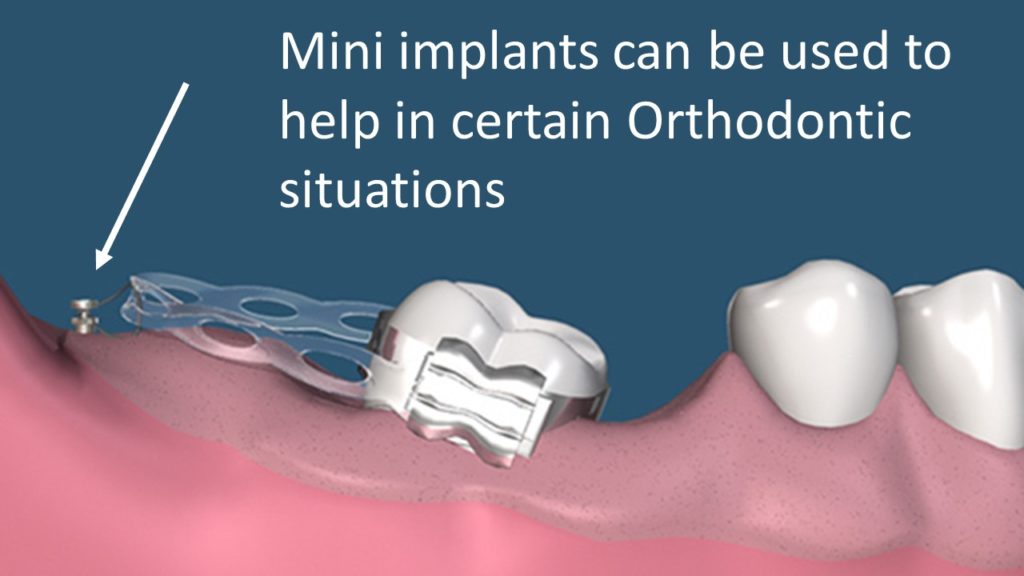Are you looking to replace missing teeth with implants but you were told you don’t have enough bone for conventional implants? Or maybe you are missing a small tooth and have been told that there’s just not enough space between the roots of the adjacent teeth to fit an implant without damaging them?
We have good news for you! Mini implants just might be the answer to your problems.
Mini implants certainly have earned their place in implant dentistry. However, they’re not appropriate in all situations. These implants are reserved for specific cases. We do not have the flexibility of choosing these implants simply because we like the idea of smaller implants or because we want a less expensive option.
The most common and primary use of mini implants in prosthodontics is in cases where a denture-wearer wants implants to help stabilize their denture, but they just don’t have enough bone for regular sized implants. In this situation, mini implants can be used with attachments to create an overdenture (“snap-on” denture).
Their use is primarily limited to:
How Are They Different From Regular Implants?
 Mini implants have the same basic structure as regular implants, but they’re smaller (about ½ the size or less). Unlike conventional implants, they’re comprised of a one-piece screw less than 2.5 mm in diameter and includes an attachment that protrudes from the gums. The prosthesis is then connected to this, whether it is a snap-on denture or an implant crown.
Mini implants have the same basic structure as regular implants, but they’re smaller (about ½ the size or less). Unlike conventional implants, they’re comprised of a one-piece screw less than 2.5 mm in diameter and includes an attachment that protrudes from the gums. The prosthesis is then connected to this, whether it is a snap-on denture or an implant crown.
A conventional implant can have diameters ranging from 3.0 to 6.0 mm. The implant screw itself has a hollow opening inside to accommodate a variety of abutment types to support a wide array of prosthetic options, be it single crowns, multi-unit bridges, or complete dentures.
Why Mini Implants?
Because of the difference between the diameters of mini versus regular size implants, their indications for use are also different. Mini dental implants are implicated in cases where conventional implants cannot be placed.
Like:
- When there is not enough bone for a full-sized implant
- When there is not enough space between the roots of very small teeth to fit a conventional sized implant
- Orthodontic purposes; as a temporary anchorage device
Benefits Of Mini Implants Include:
- Lower cost: Although the cost for mini dental implants can vary, they are generally less expensive than conventional dental implants.
- Less bone width is needed: Since mini implants are so small, they don’t require as much bone volume as conventional implants do. This makes them a good option for people who have lost a lot of bone from having missing teeth for many years or when the teeth that we need to replace are naturally very narrow (such as lower front teeth).
- Less invasive: Sometimes, people who don’t have enough bone to place conventional implants may need bone grafting prior to getting them. Depending on a person’s overall physical health and their body’s healing ability, this phase can take anywhere from 3 months to a year. Using mini implants may avoid the need bone graft procedures prior to having implants placed. Having a less invasive surgery also generally speeds up recovery time.
- Easier removal: While this does not seem like a benefit, this is what makes mini implants a great choice when they are meant to be used temporarily. Orthodontists use them as anchors when moving teeth and remove them once treatment is completed. In growing patients who want to replace a missing tooth without having to deal with a flipper, mini implants can be used to hold a fixed crown as a long-term temporary solution. Over a span of years, as the jaws continue growing, the surrounding teeth may change position while the implant stays in the same place. A revision surgery can then be carried out once growth has stabilized. The mini implant can be removed then and a regular implant placed. This allows us to ensure the permanent crown is designed in harmony with the rest of the teeth.
Who Is Not A Good Candidate For Mini Implants?
- People who grind or clench their teeth. These implants are not big or strong enough to withstand the clenching forces of the human jaw and will ultimately fail.
- People with uncontrolled diabetes.
- Smokers are at a high risk of failure.
- Anyone who is receiving chemotherapy or radiation.
- Anyone with poor oral hygiene.
Are There Any Disadvantages To Mini Implants?
Mini implants do have their drawbacks. Because they are so narrow, they are not able to support a regular-sized back teeth, such as molars or premolars. They are also not suited for restoring full arch fixed bridged, because the components are inadequately designed to accept these protheses.
Mini Implants And Overdentures (Snap-On Dentures)
They are a viable option for retaining snap-on dentures, especially when there is insufficient bone or significant cost constraints. Snap-on dentures are a lot more secure than conventional dentures, especially in the lower jaw where the tongue tends to displace them.
There is one extremely important thing to consider: remember that mini implants cannot support fixed bridges. If you have a snap-on denture held by regular implants, they can be upgrade to fixed bridges at a later date if you wish. However, if you choose mini implants at the start of your treatment, they have to remain as removable dentures – there is no option to fix them without removing the mini implants and starting from scratch.
In short, both mini implants and regular sized implants are good treatment options for snap-on dentures, but it is important to know your goals so you can pick the best choice for your situation.
How Do You Take Care Of Them?
If you have implant dentures, take them out and clean them twice a day with a denture brush and soak as needed in denture cleaner. Brush the implants twice a day with a soft toothbrush to keep the plaque that accumulates on them during wear from hardening into tartar.
If you have implant crowns, they require the same care as natural teeth. Brush twice a day with a soft toothbrush and gently floss around them (& your other teeth) daily.




